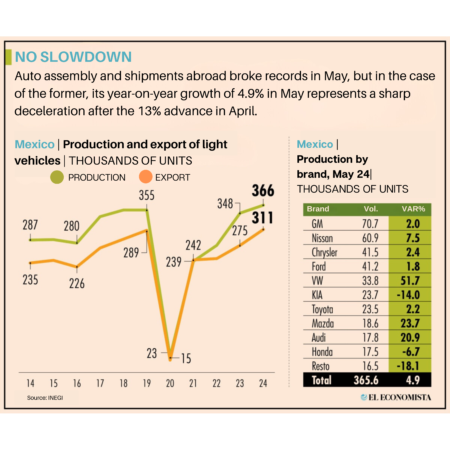During the last year, Mexico set a record in its economic history by attracting more than 36,058 million dollars of Foreign Direct Investment (FDI) in 2023. This amount highlights the confidence of international investors in the country, and in turn demonstrates the importance of promoting the manufacturing industry as one of the main competitive advantages for the arrival of new projects, creating jobs and promoting economic development, since, according to the Ministry of Economy, this activity absorbed 50% of FDI in this period.
The foreign capital that focused on industry covered several sectors, ranging from automotive production, to food, beverages, medical, chemical, metal-mechanic, electrical, electronic, plastic, rubber and others.
At a national level, it was highlighted that more than $4,817 million dollars of FDI in 2023 were destined to the creation of new companies or the incorporation of flows within companies, while $4,610 million dollars to inter-company accounts, and $24,631 million dollars to shareholders’ profits, which evidenced the existence of guarantees for the productive sector to develop and grow with guarantees in Mexico.
Consecutive growth
Internationally, the Covid-19 pandemic marked a turning point in financial terms, and in Mexico this phenomenon was a catalyst in attracting FDI, together with nearshoring.
The FDI comparison between 2020 and 2023 shows a 24% growth, going from a flow of $29,079 million dollars to more than $36,058 million dollars. During 2021, when economic activities began to reactivate after the crisis generated by the pandemic, also reflected an increase in FDI by closing with $31,621 million dollars; then, in 2022 FDI rose to $35,292 million dollars, but it should be noted that $6,875 million dollars corresponded to the merger of a media company and the restructuring of Mexicana de Aviacion.
In this context, official data show that, excluding this last movement, FDI growth between 2022 and 2023 was 27%.
Origin of investment
The investment that Mexico received in the last year came from various countries worldwide, but historically the United States has remained the leader. In 2023, the U.S. contribution was 13,641 million dollars, 38% of the total.
In second place was Spain with just over 10%, for a total of $3,774 million dollars; Canada, in third place, with just under 10%, or $3,472 million dollars; Japan, in fourth place; 8% $2,909 million dollars; Germany, in fifth place; Germany, in third place; Japan, in fourth place; and Germany, in third place, with 8% $2,399 million dollars; 7% $2,399 million dollars, Argentina, sixth place; 6% $2,248 million dollars, United Kingdom, seventh place; 3% $936 million dollars, Netherlands, eighth place; $892 million dollars, Belgium, ninth place; $759 million dollars and South Korea, tenth place; $497 million dollars.
The diversification of industries includes companies such as Bosch, BMW, Mercedes Benz, Toyota, Nisan, Hitachi, LG, Samsung, Ternium, Ford, DIAGEO, Iberdrola, Hanon Systems, Vest, TC Energy, SMTC Manufaring, GSK and Heineken; in addition to banking institutions such as Scotiabank, Banamex, BBVA, among others.
There are also companies that arrived or expanded operations in the country during this period, such as Sempra Energy, Molymex, Cargill, Continental, Flextronics, Pfizer, Indorama Ventures, Tetra Pak, Borg Warner, Rekit and Aptiv.
Specialized manufacturing
The Ministry of Economy emphasized that 50% of the FDI that came to the country in 2023 was destined to the manufacturing industry, which represents an amount of $18,081 million dollars.
Mexico, which is characterized for being a specialized manufacturing center, reported the flow of FDI in five categories related to industrial activity; in manufacturing of transportation equipment which in turn accumulated 41% of the budget, production of beverages and tobacco 14%, metals 13%, computer equipment 9% and the chemical industry 8%.
In addition, in the statistics of the Ministry of Economy, the production of equipment for energy generation accounted for 5%. On the other hand, 76% of the FDI registered in 2023 is concentrated in 10 Mexican states: Mexico City, Sonora, Nuevo Leon, Jalisco, Chihuahua, State of Mexico, Baja California, Aguascalientes, San Luis Potosi and Queretaro.
In particular, the leading state Mexico City accumulated 31% ($11,197 million dollars), Sonora, 8% ($2,706 million dollars); Nuevo Leon, 7% ($2,537 million dollars); Jalisco, 6% ($2,028 million dollars), Chihuahua, 5% ($1,980 million dollars), State of Mexico, 5% ($1,927 million dollars); Baja California, 4% ($1,472 million dollars); Aguascalientes, 4% ($1,379 million dollars); San Luis Potosí, 3% ($1,116 million dollars), and Querétaro, 3% ($1,107 million dollars). The United States is the country with the largest investment in all regions of Mexico.
Sectoral capture
When reviewing state statistics and their impact by sector, the picture changes. For example, in metal mechanics; where the list is headed by Nuevo Leon, with more than $1,442 million dollars; followed by Aguascalientes, $877 million dollars; Jalisco, $556 million dollars; Chihuahua, $288 million dollars, and Veracruz, $268 million dollars.
Mexico City is the state that led the absorption of the chemical industry with more than $582 million dollars; then Puebla, $313 million dollars; State of Mexico, $160 million dollars; Queretaro, $115 million dollars; and Morelos, $105 million dollars.
On the other hand, in the electric-electronic sector, Jalisco was positioned as leader in the reception of capital, with an absorption of more than $2,555 million dollars, Chihuahua was in second place with $570 million dollars, Mexico City with $481 million dollars, Nuevo Leon with $417 million dollars and Tamaulipas with $155 million dollars.
Meanwhile, in the automotive industry, Mexico City remained in first place with more than $1.248 billion dollars, followed by Aguascalientes, $1.132 billion dollars; State of Mexico, $1.118 billion dollars; Chihuahua, $779 billion dollars; and Guanajuato, $702 billion dollars.
The manufacture of machinery and equipment was another central aspect in attracting FDI; Mexico City accounted for more than $94 million dollars; Queretaro, $51 million dollars; Chihuahua and Tamaulipas, $42 million dollars; Baja California, $35 million dollars.
With this, Mexico continues to position itself as one of the most attractive destinations for the manufacturing industry, not only because of its geographic position and logistical advantages, but also because of the support and financial performance in recent years that ensure that even in periods of uncertainty such as the pandemic, economic movements are generated for the benefit of the business sector.
By surpassing all federal statistics, in 2024 Mexico seeks to strengthen and surpass the economic records achieved in 2023, and thus further highlight its position as a leader in global investment.

Source: Mexico Industry




 Source:
Source: 


 Source:
Source: 

